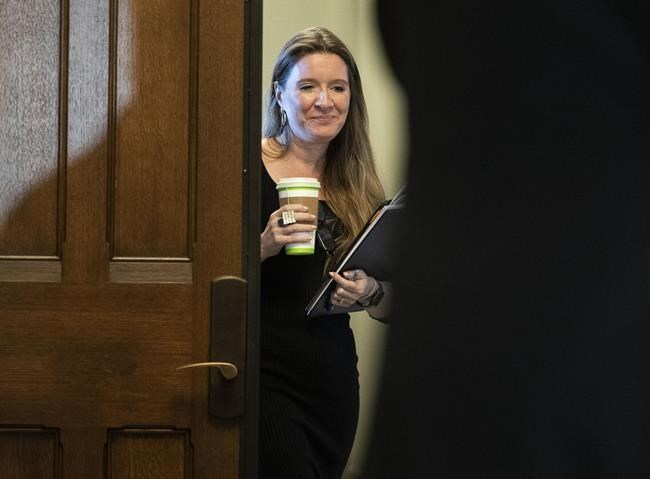OTTAWA — One of the longest House of Commons committee filibusters in the last 10 years was the recent marathon attempt by the Liberals to prevent the prime minister's chief of staff from testifying about foreign interference.
Throughout February and March, government members of the procedure and House affairs committee argued that Katie Telford should answer questions because of ministerial responsibility: the idea that it is up to ministers — including the prime minister — to speak on behalf of their files, staff and departments.
"This is essentially the way the executive is held to account," said Lori Turnbull, director of Dalhousie University's school of public administration.
Telford eventually agreed to testify sometime this week, following mounting pressure from the Conservatives, who had support from the New Democrats and Bloc Québécois.
That ended about 24 hours of Liberal stalling that lasted through several committee meetings. According to data from the Library of Parliament and Committees and Legislative Services Directorate, it was the fourth-longest filibuster in the last decade of House committees.
Both Liberal and Conservative governments have used ministerial responsibility to prevent their staff from testifying before committees.
The idea is predicated on the notion that ministers run the show. But Alex Marland, a professor of political science at Memorial University of Newfoundland, said staffers have absorbed new powers, and in some cases, even cut ministers out of what they're doing.
"The system was not designed to have people unelected, appointed, involved in politics and deeply embedded in government, sometimes exerting the authority of cabinets," said Marland, who researches political communication.
He believes that change calls for a review of Canada's democratic processes.
"The public service has grown so much, and so much has changed in society," he said.
"We really need to be able to get a better handle on recommendations to make the public service and the system of government as strong as it can be."
Staffers often use social media to amplify government messages, becoming public figures in their own right, Marland said, at times getting involved in the political fray.
"I think an awful lot of times they're the ones kind of setting the course of government, or are perceived to be. And that's the thing about politics, a lot of the time it's the idea that perception is reality," Marland said.
"If … all of us think that these staffers have all this power, then it's only natural that we are going to then expect some measure of accountability somewhere. And the minister isn't always best placed to do that."
It has become quite common for government staff to testify at committees, though that is a departure from how Westminster systems of Parliament typically operate. Telford herself has appeared before, as have chiefs of staff for former Conservative prime ministers Stephen Harper and Brian Mulroney.
Like Telford, staffers are often invited to government caucus meetings, a practice that was once off-limits to unelected chiefs of staff.
"Now there's a gaggle of them" taking notes, monitoring what MPs are saying and who takes issue with the leader, Marland said.
"Political staff were not there before. This is a perfect example of how things have changed."
Ministers also stay in their roles despite inappropriate behaviour, said Turnbull, another way that ministerial responsibility has changed.
She pointed to International Trade Minister Mary Ng, who last year broke federal ethics rules after failing to recuse herself from a decision to award her friend was a government contract.
"There's a tendency now to sort of say 'Let's see if we can get through this. Let's ignore this and maybe it'll go away' as opposed to sending that signal and taking that step of a minister leaving the cabinet because the minister made a mistake," Turnbull said.
"If the prime minister wants the minister in the job, the minister stays in the job."
Turnbull said there should be a full public inquiry into the integrity and the health of Canada's democracy.
"I think as the days go on, we are in more dire need of a critical conversation about how democracy works or doesn't," she said. "And foreign interference is only one part."
This report by The Canadian Press was first published April 9, 2023.
Mickey Djuric, The Canadian Press

